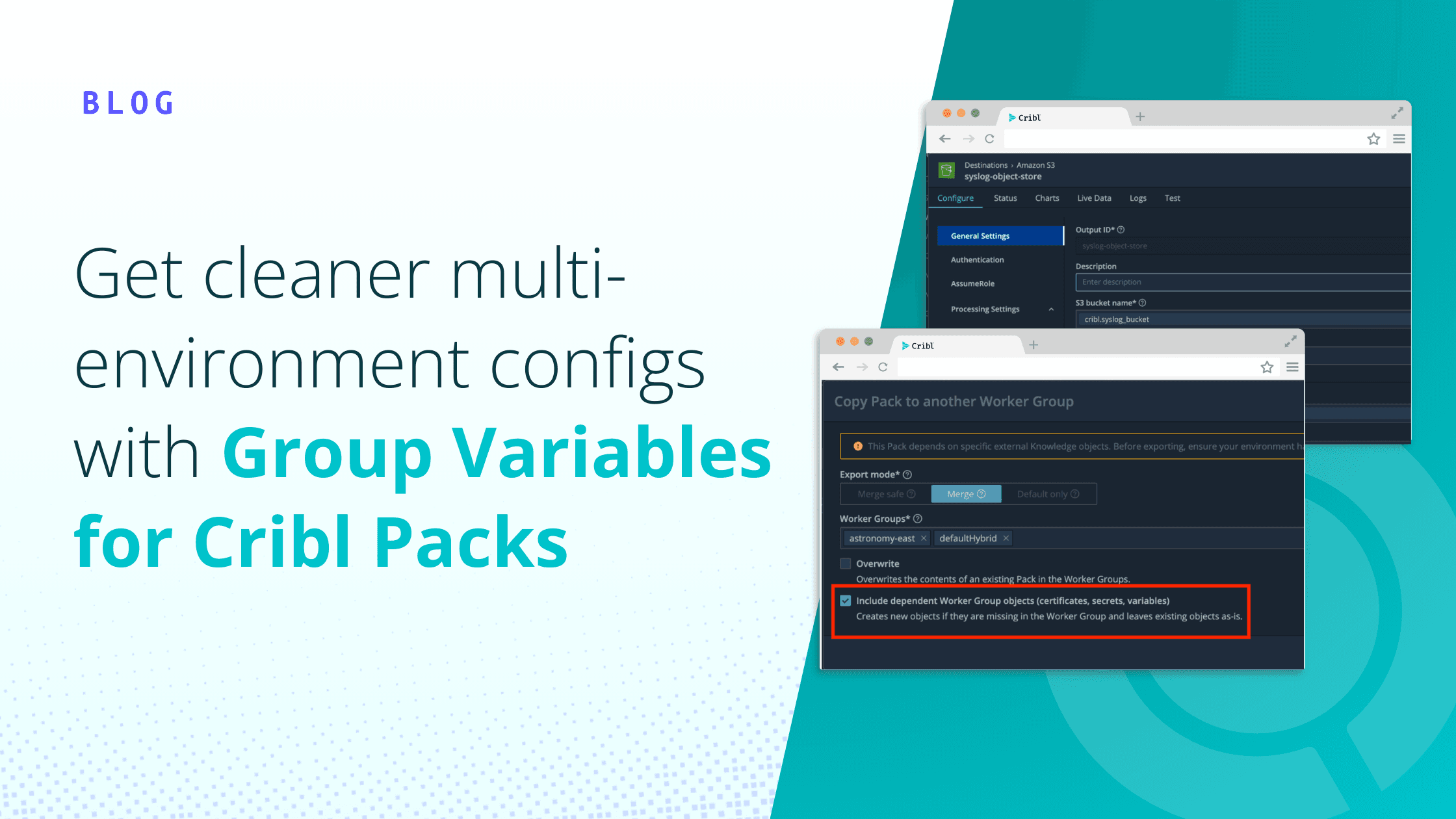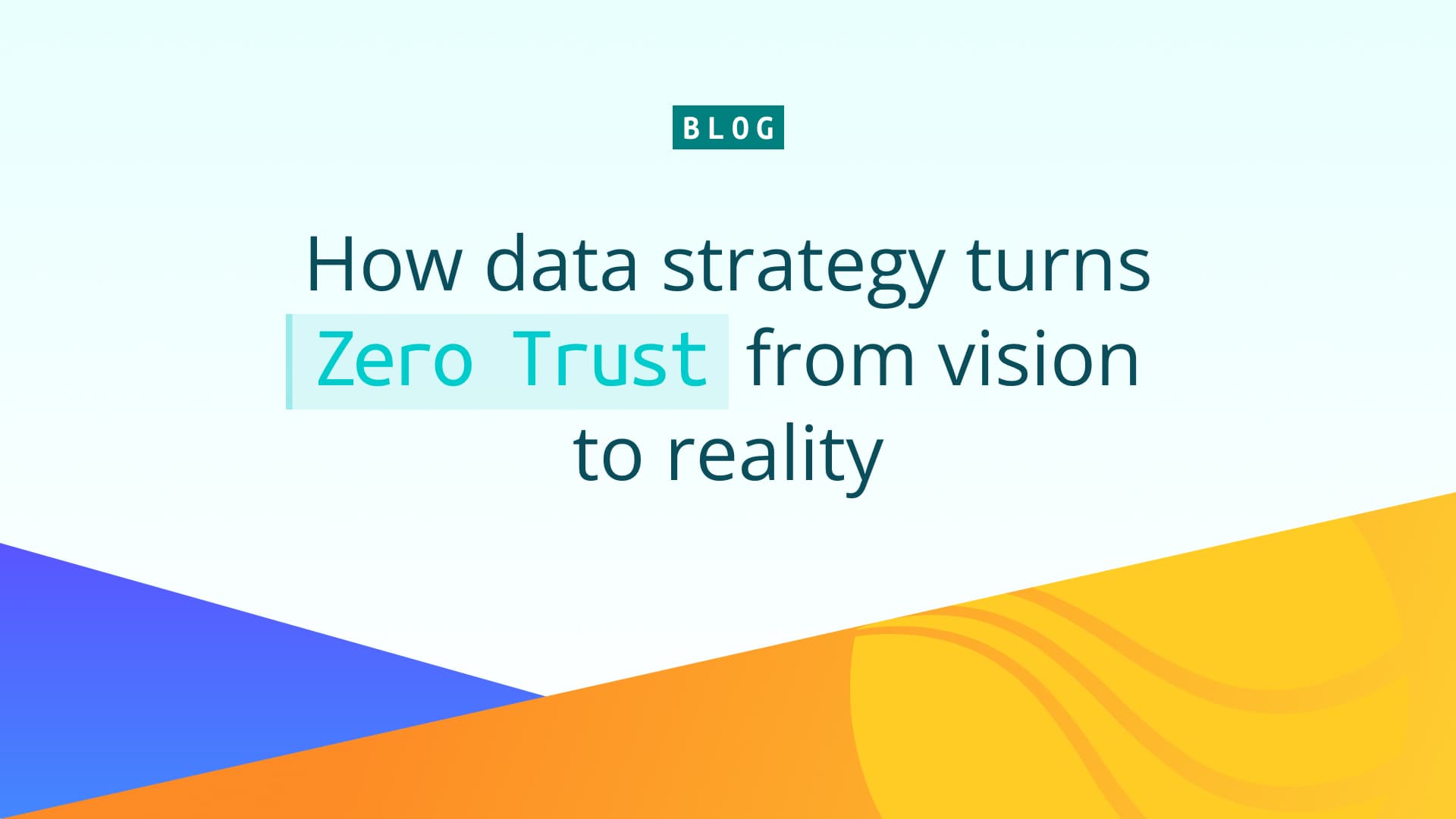In the dynamic world of observability and analytics, everyone’s looking for smarter, more efficient, and interoperable ways to handle their data. That’s where Cribl steps in, bringing you an exciting update to our product lineup. We’re thrilled to introduce the OTLP Metrics Function to Cribl Stream 4.5! This Function converts metrics into the OpenTelemetry Protocol (OTLP) format with ease! Alongside support for dimensional metrics like StatsD Extended and CloudWatch Metrics, the OTLP Metrics Function also ensures your Prometheus metrics are OTLP-ready.
It’s like setting up a successful blind date between your data and the broad compatibility of OpenTelemetry (OTel). No awkward first meetings here; we’re talking love at first integration.
The best part, at least for your developers, is that you reduce the burden on your devs to update their apps to a new metrics model. Plus, you can use best-in-class OTel-compatible tooling. Who doesn’t like options?
This new Stream 4.5 capability maximizes the utility of your data, so it fits seamlessly into your existing systems while opening up new possibilities for scalability and choice in your org’s observability ecosystems.
Introduction
Monitoring and observability tools have come a long way, constantly evolving to meet the needs of complex, modern systems. Prometheus, an open-source monitoring and alerting toolkit, has been a favorite for many, thanks to its robust approach to collecting and organizing data from different sources. Prometheus’ design centers around a multi-dimensional data model and a flexible query language, making it a preferred choice for monitoring highly dynamic service-oriented architectures.
As our digital landscapes grow (Read: Moar cloud-native technologies and microservices), we need tools that not only collect data but also speak a common language, making it easier to understand and use this data across different platforms. That’s where OpenTelemetry (OTel) comes in.
Positioned under the Cloud Native Computing Foundation (CNCF), OpenTelemetry offers a comprehensive collection of APIs, libraries, agents, and instrumentation standards. These components work together to standardize the collection and exportation of telemetry data in a vendor-neutral format. OpenTelemetry’s initiative is a collaborative effort aimed at unifying observability frameworks, so that traces, metrics, and logs are consistently understood and processed across diverse environments.
The Problem with Prometheus
That said, pimpin’ merging data from Prometheus into the OpenTelemetry ecosystem ain’t easy. There are some fundamental differences in the data models, metric types, and aggregation methods at play. They’re a bit like two different dialects of the same language. Cribl’s new feature shines here as a bridge into the OpenTelemetry Protocol format. This way, you get the best of both worlds: the rich detail of your data and the broad compatibility of OTel.
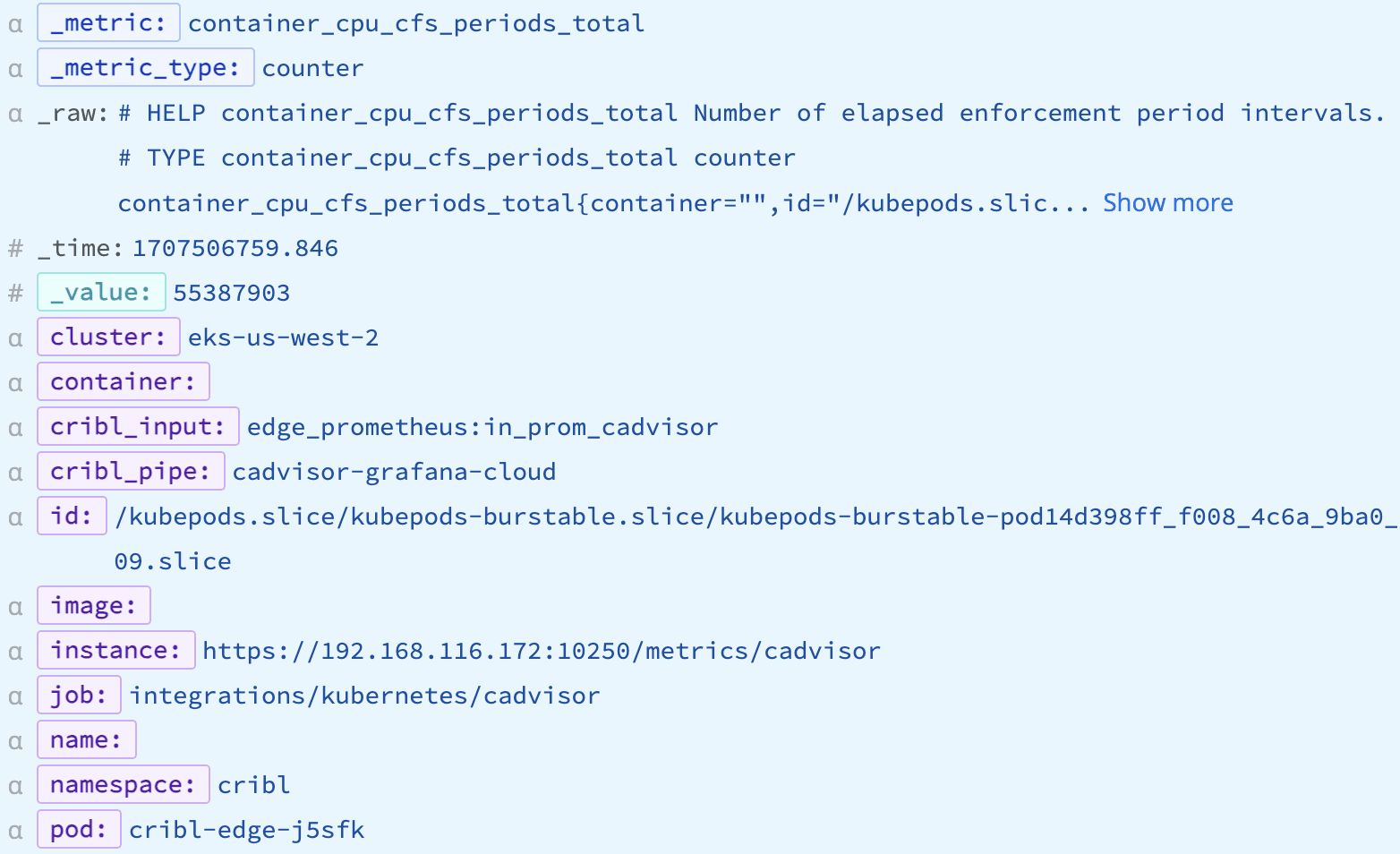
Screenshot showing Prometheus metrics, before conversion with Cribl Stream 4.5.
By introducing a Function to seamlessly convert metrics like Prometheus into OTLP, Cribl is addressing a critical gap in observability.
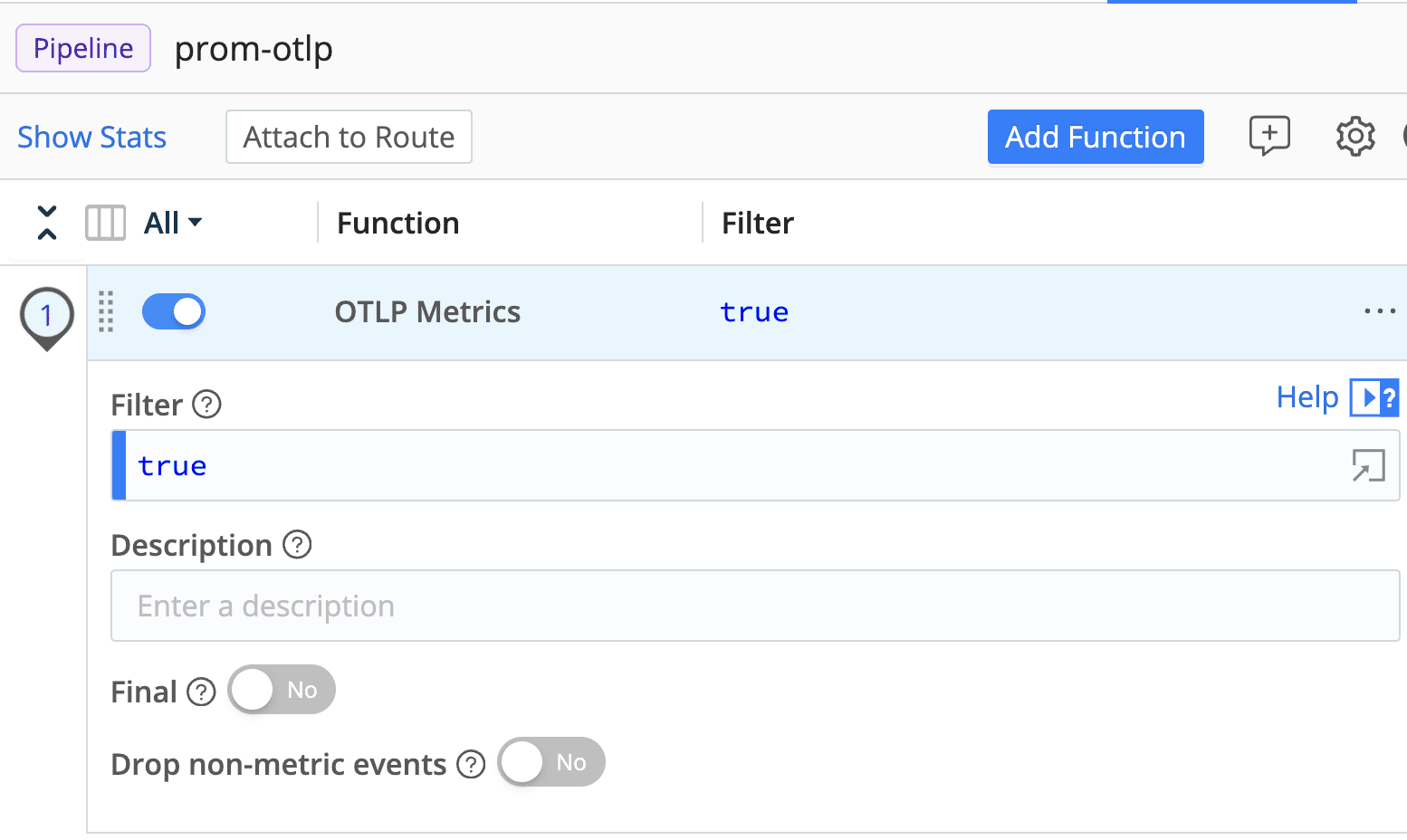
The OTLP Metrics Function as seen in Cribl Stream 4.5.
When we simplify this process, we extend the utility of Prometheus within the OpenTelemetry framework without the need for complex Processors and Extensions. This way, Cribl enables you to unlock the full potential of your data, regardless of its source or format, positioning your organization at the cutting edge of technology and maintaining a competitive edge in an increasingly data-driven world.
Use Cases
Common Metric Theory/Consistent Vendor-neutral Methodology
OpenTelemetry Metrics semantics present a unified solution to the challenge of diverse, vendor-specific metric schemas within observability platforms. By standardizing telemetry data representation, you get a consistent, vendor-neutral methodology for collecting, querying, and interpreting metrics across various systems. That streamlines decision-making and troubleshooting for teams, fostering a cohesive environment free from vendor lock-in.
Vendor-agnostic Routing
Building on this foundation, the OpenTelemetry project advocates for a vendor-neutral telemetry framework that puts the generation, collection, management, and export of telemetry data first, deliberately separating these functions from storage and visualization to encourage a modular observability landscape. This architecture promotes a singular telemetry format as the source of truth, so organizations can select their tools without getting rekt by compatibility issues or hassled by reinstrumentation.
Enriching Metrics With Application Context
Taking it a step further, imagine linking every metric back to its origin within your application.
Nice, right?
OpenTelemetry’s Context Propagation and Baggage features allow for the sophisticated association of metrics with application context. Converting metrics from traditional formats, like Prometheus, into the OTLP format connects metrics with traces and logs, and wraps them in rich context through trace and span IDs and/or Resource attributes. That explicit and implicit contextual info means improved operational insights, reduced Mean Time To Resolution (MTTR), and better overall operational efficiency for your complex distributed environments.
Realize Integration Without Complex Configuration
The latest addition to Cribl Stream elegantly integrates dimensional metrics (e.g., Prometheus metrics) into the OTLP framework, smoothing over the complexities of observability integration. This simplification amplifies the value of Prometheus and other metrics within the OpenTelemetry ecosystem, removing the need for complex configurations.
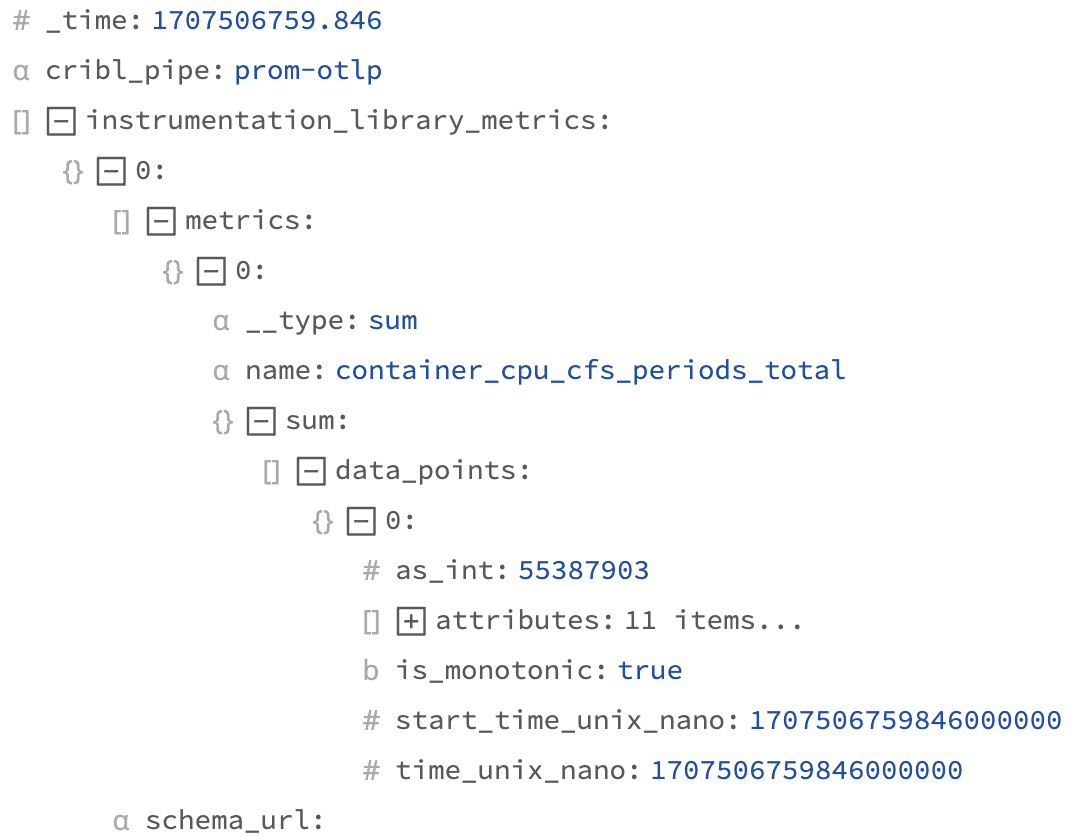
Screenshot showing Prometheus metrics after conversion to OTLP format using Cribl Stream 4.5.
Wrapping Up
Let’s recap the benefits again for the people in the back.
With Stream 4.5, you unlock the ability to convert dimensional metrics to the OTLP format, so you can:
Bring uniformity to metric handling across platforms with OpenTelemetry (OTel) Metrics, ensuring consistency.
Simplify operations with a cohesive strategy that accelerates decision-making and troubleshooting for teams.
Encourage a flexible observability environment with OTel’s architecture, enabling seamless tool integration without compatibility issues.
Provide deeper insights by associating metrics with application specifics for a comprehensive understanding of operations.
Enable a clearer picture of system performance by fusing metrics with contextual details, especially in complex settings.
Ready to get started? Upgrade to Stream 4.5, and head to our documentation for a step-by-step walkthrough.



